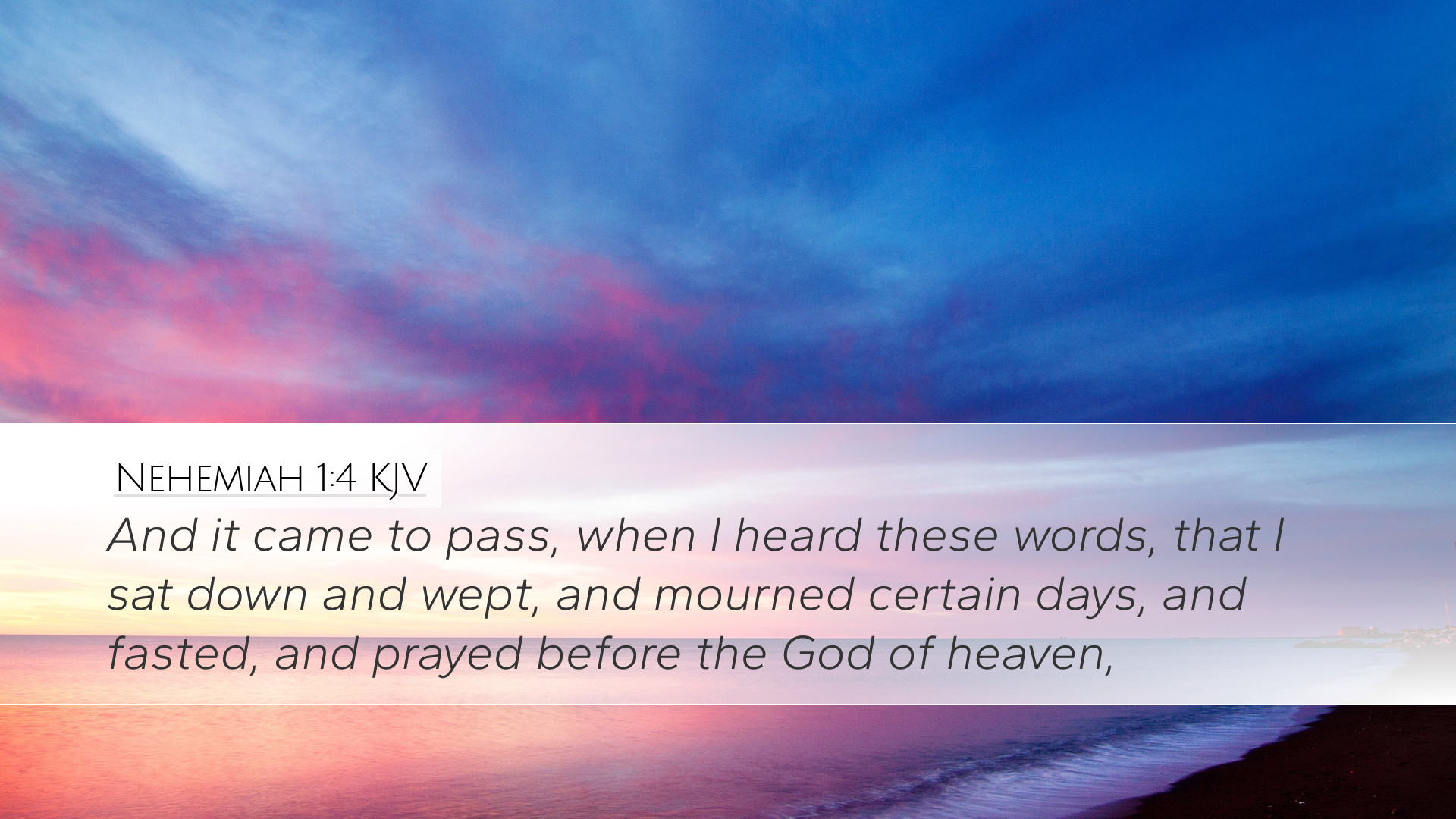Old Testament
Genesis Exodus Leviticus Numbers Deuteronomy Joshua Judges Ruth 1 Samuel 2 Samuel 1 Kings 2 Kings 1 Chronicles 2 Chronicles Ezra Nehemiah Esther Job Psalms Proverbs Ecclesiastes Song of Solomon Isaiah Jeremiah Lamentations Ezekiel Daniel Hosea Joel Amos Obadiah Jonah Micah Nahum Habakkuk Zephaniah Haggai Zechariah MalachiNehemiah 1:4
Nehemiah 1:4 KJV
And it came to pass, when I heard these words, that I sat down and wept, and mourned certain days, and fasted, and prayed before the God of heaven,
Nehemiah 1:4 Bible Commentary
Commentary on Nehemiah 1:4
Nehemiah 1:4 (KJV): "And it came to pass, when I heard these words, that I sat down and wept, and mourned certain days, and fasted, and prayed before the God of heaven."
Introduction
The verse Nehemiah 1:4 serves as a poignant introduction to Nehemiah’s fervent concern for his people and their homeland. It sets the stage for the rebuilding of Jerusalem and highlights the deep emotional and spiritual turmoil that prompted Nehemiah to take action. This commentary will explore the significance of Nehemiah’s reaction, the cultural context, and the lessons that can be drawn for contemporary believers.
Nehemiah's Response
Upon hearing the report about Jerusalem’s desolate state, Nehemiah's immediate reaction was one of profound sorrow. This emotional response can be viewed through several lenses:
- Empathy for the People: Nehemiah’s weeping illustrates his deep compassion for the Jewish exiles suffering in Babylon. His emotional reaction signifies a leader who is deeply connected to the well-being of his people.
- Recognition of Sin: His mourning may also imply an acknowledgment of the sins that led to Jerusalem's downfall. According to Matthew Henry, this sorrow is indicative of genuine repentance.
- Call to Action: The intensity of Nehemiah's sorrow was not merely emotional; it compelled him to action. This illustrates the truth that heartfelt concern for others often leads to a desire for change.
The Role of Prayer and Fasting
Nehemiah’s choice to fast and pray reflects a humble dependence on God. Albert Barnes highlights the importance of these spiritual disciplines as vital responses to times of distress.
- Fasting: This act demonstrates Nehemiah's prioritization of spiritual needs over physical ones. It is a form of humility before God, acknowledging that human efforts alone are inadequate for the monumental task ahead.
- Prayer: Nehemiah’s prayerful posture signifies reliance on divine guidance. Adam Clarke underscores that prayer is an acknowledgment of God’s sovereignty and an expression of Nehemiah’s desire for God’s intervention.
Contextual Analysis
Understanding the historical backdrop enhances our grasp of Nehemiah's actions. During the period of Nehemiah's ministry, Jerusalem lay in ruins, and the Jewish people faced discouragement and oppression. The reports Nehemiah received were likely filled with despair, highlighting the urgency of his response.
- Historical Context: Following the Babylonian exile, many Jews returned to Jerusalem, but faced significant challenges both from external enemies and from their own internal struggles. Nehemiah's heartfelt anguish resonates with the broader themes of restoration found throughout the Old Testament.
- Cultural Insights: Mourning was a culturally accepted expression of grief and solidarity. Nehemiah's actions align with Jewish traditions of lament and intercession.
Practical Applications
The heartfelt sorrow of Nehemiah can inspire contemporary leaders, theologians, and students in several ways:
- Compassionate Leadership: Nehemiah's example encourages leaders to be emotionally connected to those they serve. Genuine empathy can cultivate unity and motivation within a community.
- The Power of Prayer: His commitment to prayer emphasizes its critical role in decision-making and leadership. Today, leaders are reminded to seek God’s guidance in all endeavors.
- Engagement with Community Issues: Nehemiah's story advocates for active involvement in addressing social and spiritual needs. This serves as a call for modern believers to take tangible steps toward community healing.
Conclusion
Nehemiah 1:4 offers a profound insight into the character of a leader who responds to despair not with apathy, but with fervor. His sorrow, prayer, and fasting exemplify a holistic approach to addressing community crises anchored in faith. His actions serve as an enduring reminder that we are called not only to recognize needs but also to act diligently and prayerfully in response to them.
This verse invites pastors, scholars, and students alike to reflect on their roles in their communities, urging a posture that mirrors Nehemiah’s blend of compassion, prayer, and decisive action.


